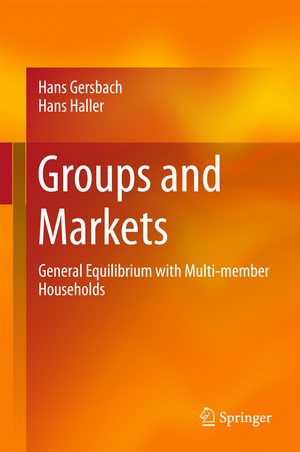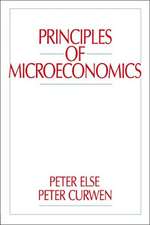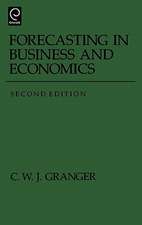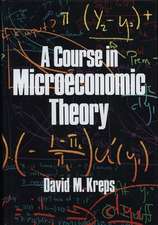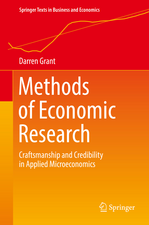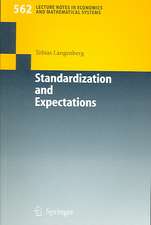Groups and Markets: General Equilibrium with Multi-member Households
Autor Hans Gersbach, Hans Halleren Limba Engleză Hardback – 7 aug 2017
In the field of family economics, Hans Haller and Hans Gersbach have pioneered a ‘market’ approach that applies the tools of general equilibrium theory to the analysis of household behavior. This very interesting book presents an overview of their methods and results. This is an inspiring work.
Pierre-André Chiappori, Columbia University, USA
The sophisticated, insightful and challenging analysis presented in this book extends the theory of the multi-person household along an important but relatively neglected dimension, that of general equilibrium theory. It also challenges GE theorists themselves to follow Paul Samuelson in taking seriously the real attributes of that fundamental building block, the household, as a social group whose decisions may not satisfy the standard axioms of individual choice. This synthesis and extension of their earlier work by Gersbach and Haller will prove to be a seminal contribution in its field.
Ray Rees, LMU Munich, Germany
| Toate formatele și edițiile | Preț | Express |
|---|---|---|
| Paperback (1) | 635.65 lei 6-8 săpt. | |
| Springer International Publishing – 12 mai 2018 | 635.65 lei 6-8 săpt. | |
| Hardback (1) | 563.54 lei 17-23 zile | +49.65 lei 5-11 zile |
| Springer International Publishing – 7 aug 2017 | 563.54 lei 17-23 zile | +49.65 lei 5-11 zile |
Preț: 563.54 lei
Preț vechi: 704.42 lei
-20% Nou
Puncte Express: 845
Preț estimativ în valută:
107.85€ • 112.18$ • 89.03£
107.85€ • 112.18$ • 89.03£
Carte disponibilă
Livrare economică 20-26 martie
Livrare express 08-14 martie pentru 59.64 lei
Preluare comenzi: 021 569.72.76
Specificații
ISBN-13: 9783319605159
ISBN-10: 3319605151
Pagini: 170
Ilustrații: X, 186 p. 1 illus.
Dimensiuni: 155 x 235 mm
Greutate: 0.47 kg
Ediția:1st ed. 2017
Editura: Springer International Publishing
Colecția Springer
Locul publicării:Cham, Switzerland
ISBN-10: 3319605151
Pagini: 170
Ilustrații: X, 186 p. 1 illus.
Dimensiuni: 155 x 235 mm
Greutate: 0.47 kg
Ediția:1st ed. 2017
Editura: Springer International Publishing
Colecția Springer
Locul publicării:Cham, Switzerland
Cuprins
Part I: The Theme.- Introduction.- Social Groups.- Households.- Part II: The Basic Framework.- Pure Exchange with Fixed Household Structure.- General Equilibrium with Fixed Household Structure and Production.- General Equilibrium with Variable Household Structure.- General Equilibrium with Endogenous Household Structure.- Cores.- Part III: Other Forms of Group Formation.- Clubs, Matching, etc.- Related Work.- Part IV: Extensions and Applications.- Power in General Equilibrium.- Risk Sharing Capacity: Markets versus Households.- Inefficient Household Decisions.- Public Goods and Public Choice.- Economic Policy Analysis and Implications.
Textul de pe ultima copertă
This monograph studies multi-member households or, more generally, socio-economic groups from a purely theoretical perspective and within a general equilibrium framework, in contrast to a sizeable empirical literature. The approach is based on the belief that households, their composition, decisions and behavior within a competitive market economy deserve thorough examination. The authors set out to link the formation, composition, decision-making, and stability of households. They develop general equilibrium models of pure exchange economies in which households can have several, typically heterogeneous members and act as collective decision-making units on the one hand and as competitive market participants on the other hand. Moreover, the more advanced models combine traditional exchange (markets for commodities) and matching (markets for people or partners) and develop implications for welfare, social structures, and economic policy.
In the field of family economics, Hans Haller and Hans Gersbach have pioneered a ‘market’ approach that applies the tools of general equilibrium theory to the analysis of household behavior. This very interesting book presents an overview of their methods and results. This is an inspiring work.
Pierre-André Chiappori
, Columbia University, USAThe sophisticated, insightful and challenging analysis presented in this book extends the theory of the multi-person household along an important but relatively neglected dimension, that of general equilibrium theory. It also challenges GE theorists themselves to follow Paul Samuelson in taking seriously the real attributes of that fundamental building block, the household, as a social group whose decisions may not satisfy the standard axioms of individual choice. This synthesis and extension of their earlier work by Gersbach and H
aller will prove to be a seminal contribution in its field. Ray Rees, LMU Munich, Germany
In the field of family economics, Hans Haller and Hans Gersbach have pioneered a ‘market’ approach that applies the tools of general equilibrium theory to the analysis of household behavior. This very interesting book presents an overview of their methods and results. This is an inspiring work.
Pierre-André Chiappori
, Columbia University, USAThe sophisticated, insightful and challenging analysis presented in this book extends the theory of the multi-person household along an important but relatively neglected dimension, that of general equilibrium theory. It also challenges GE theorists themselves to follow Paul Samuelson in taking seriously the real attributes of that fundamental building block, the household, as a social group whose decisions may not satisfy the standard axioms of individual choice. This synthesis and extension of their earlier work by Gersbach and H
aller will prove to be a seminal contribution in its field. Ray Rees, LMU Munich, Germany
Caracteristici
Provides a thorough theoretical analysis of the behavior and decisions of multi-member households or socio-economic groups Integrates several allocation mechanisms to allow the observation of equilibrium feedbacks Contrasts the particularities of household formation and decisions with club and matching models Explores the positive and normative consequences of collective decisions in households Includes supplementary material: sn.pub/extras
